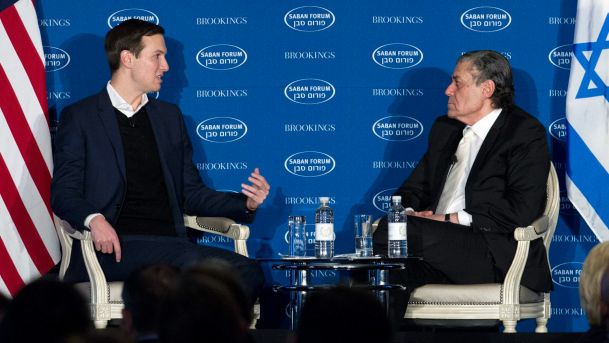By Kent R. Kroeger (Source: NuQum.com, January 9, 2018)
{Send comments to: kkroeger@nuqum.com or kentkroeger3@gmail.com}
Last week, the U.S. State Department reportedly froze more than $100 million previously committed to the UN Relief and Works Agency (UNRWA) and its work in the West Bank and Gaza Strip.
Prior to this funding pause, US Ambassador to the UN Nikki Haley said the money would not be forthcoming unless Palestinian Authority President Mahmoud Abbas comes to the peace table.
According to the Israeli newspaper Haaretz, Prime Minister Benjamin Netanyahu reinforced Haley’s UN speech with his own reported support of a gradual cutback of American funding to the United Nations Relief and Work Agency (UNRWA) for Palestinian refugees.
As unsurprising as the unity between the Donald Trump administration and Netanyahu might be, it is more interesting that mainstream Israeli opinion on cutting back funding to UNRWA is more thoughtful and measured.
Representative of this more temperate view, journalist Amos Harel for Haaretz.com writes:
“U.S. Ambassador to the UN Nikki Haley’s declaration that the United States intends to cut aid the Palestinians, and possibly to UNRWA, is no less worrying to Israel than it is to the Palestinian Authority. Officially, Israel has come out time after time against UNRWA employees’ flirtation with messages supporting terror and the funding the agency provides for the grandchildren of the original Palestinian refugees from 1948. In practice, however, the agency funds educational activities and medical services for hundreds of thousands of Palestinians, and a sharp cut in its resources could bring thousands of them into the streets to confront the Israeli army.”
On the ground, it is the U.S. and UNRWA partially subsidizing Israel’s policies in the West Bank and Gaza Strip. Without this aid to the West Bank and Gaza Strip, thousands of Palestinians would lose access to vital education and health care services and the expectation is Hamas, the de facto governing authority of the Gaza Strip, would most benefit from the subsequent social discontent.
According to a December 2016 U.S. congressional report, the U.S. has historically provided around $400 million per year to the Palestinians, though for 2017 it was around $363 million. UNRWA, in turn, provided $248 million to the Gaza Strip and $113 to the West Bank in 2017, with around $130 of that aid being part of the U.S.’s $363 annual aid to Palestinians. In total, about $600 million is provided to the West Bank and Gaza Strip through UNRWA and the U.S.
The UNRWA and U.S. aid is critical to sustaining Palestinian civil society and, should it go away, would be shifted in all likelihood to the Israelis whose 2018 national budget is around $119 billion. In other words, UNRWA and U.S. aid to the West Bank and Gaza Strip would account for less than 1 percent of the Israeli annual budget.
Israel can afford taking on an additional financial burden with respect to the West Bank and Gaza Strip; but, by doing so, would be making a sotto voce acknowledgement of its sovereignty over those territories.
As of now, Israel and the Palestinians are not prepared to make the psychological leap necessary to entertain (much less implement) a One-State-Solution — but that is where the two parties are headed and it is not obvious what will stop its current momentum.
The Trump administration’s policy towards Israel is presently led by Trump’s son-in-law Jared Kushner and U.S. Ambassador to Israel David Friedman. Neither is trained nor in possession of the substantive experience required to broker negotiations between the Israelis and Palestinians — yet, that is the conceit of the Trump administration.
If there is any doubt of the Kushner team’s lack of qualifications to broker a deal, click on the photo below to watch Kushner’s interview with Haim Saban, an Israeli-American billionaire, who hosted the Saban Forum 2017 at the Brookings Institute in December 2017. Kushner was so stunningly ill-prepared to address the conflict’s basic issues that what started as a sympathetic audience turned openly hostile to Kushner’s lightweight responses to Saban’s questions. Like his father-in-law, Kushner keeps his stable geniusness under tight wraps, far out of public view.
[Click the image below to watch Kushner’s interview with Haim Saban]

Many Middle East observers think Jared Kushner is unfit for a diplomatic role this important. On the job for almost a year now, the Saban interview demonstrates he has acquired only superficial knowledge of the Israeli-Palestinian situation.
With dilettante diplomats like Kushner and Friedman at the helm, the best outcome the Trump administration can hope for is to maintain the status quo in the region without causing any unnecessary crises or disruptions. Of course, unilaterally moving the U.S. Embassy to Jerusalem carried significant risk to do just that — but, so far, it has not.
From the Israeli perspective, the status quo serves their short-term interests just fine. They’ve been doing the diplomatic rope-a-dope for 50 years now, why stop now? But the amateurishness of Kushner’s negotiation team poses a significant long-term risk to the Israelis if the Kushner/Friedman team’s undisguised allegiance with the Israelis convinces the Palestinians that the Two-State-Solution is finally dead and negotiations towards that end pointless. If that day arrives, and some observers think it already has, there will remain just two possibilities for the Israelis and Palestinians: (1) Perpetuate the status quo indefinitely, or (2) pursue some form of a One-State-Solution.
Neither side is close to publicly considering the second option, but that is where the arc of history is taking them.
Part 2 of this essay will discuss the many barriers to a One-State-Solution and why it will ultimately work.
K. R. K.
{Send comments to: kkroeger@nuqum.com or kentkroeger3@gmail.com}
About the author: Kent Kroeger is a writer and statistical consultant with over 30 -years experience measuring and analyzing public opinion for public and private sector clients. He also spent ten years working for the U.S. Department of Defense’s Office of the Under Secretary of Defense for Personnel and Readiness and the Defense Intelligence Agency. He holds a B.S. degree in Journalism/Political Science from The University of Iowa, and an M.A. in Quantitative Methods from Columbia University (New York, NY). He lives in Ewing, New Jersey with his wife and son.
